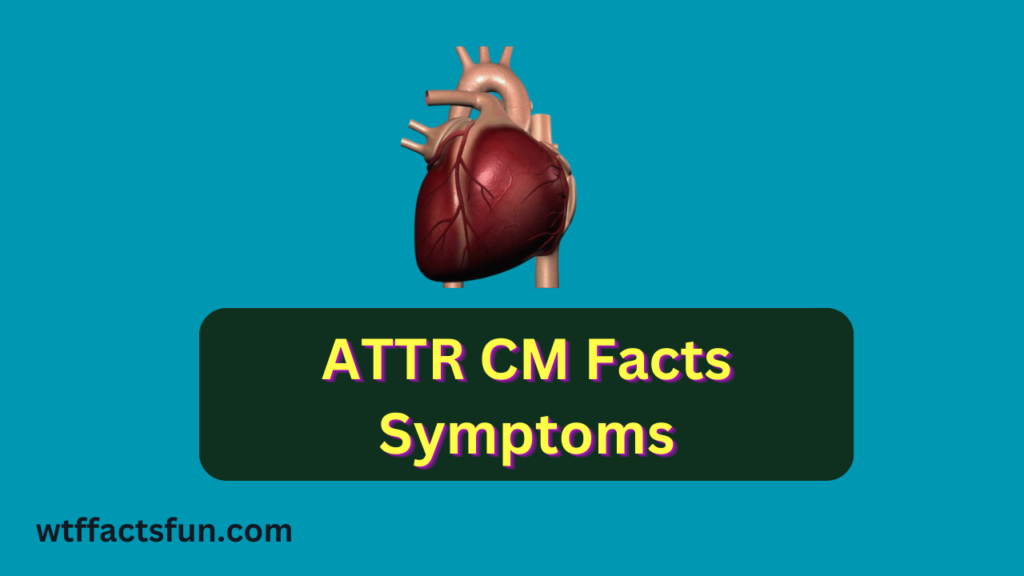
Table of Contents
ATTR CM Facts Symptoms
ATTR CM Facts Symptoms: In the realm of cardiac health, ATTR cardiomyopathy (ATTR-CM) is a condition that deserves attention. Often characterized by the deposition of clumps of amyloid in the heart tissue, this condition can significantly affect the heart’s ability to function properly. In this comprehensive guide, we will delve into the facts and symptoms associated with ATTR-CM, shedding light on its intricacies and how it impacts individuals.
What is ATTR Cardiomyopathy?
A Cardiac Challenge
ATTR cardiomyopathy, often abbreviated as ATTR-CM, is a cardiac disorder that primarily involves the accumulation of amyloid fibrils in the heart. These amyloid deposits can lead to structural and functional changes in the heart muscle, impairing its ability to pump blood effectively. The condition is categorized into two main types: hereditary (familial) and non-hereditary (sporadic) ATTR-CM.
Facts About ATTR-CM
1. Two Variants
ATTR-CM is classified into two main variants: wild-type ATTR (ATTRwt) and hereditary ATTR (hATTR). Wild-type ATTR is non-hereditary and typically affects older individuals, while hereditary ATTR is inherited and can manifest at an earlier age.
2. Protein Misfolding
The development of ATTR-CM is closely associated with the misfolding of a protein called transthyretin (TTR). This misfolded protein forms amyloid fibrils that accumulate in various tissues, including the heart.
3. Prevalence
ATTR-CM is more commonly observed in older individuals and is often underdiagnosed or misdiagnosed as other heart conditions. It is particularly prevalent among Caucasian men over the age of 65.
4. Non-Inherited Cases
While hereditary ATTR-CM is linked to genetic mutations and can be passed down through families, non-inherited or sporadic cases can also occur. These cases typically affect individuals without a family history of the disease.
Risk Factors for Hereditary ATTR-CM
- Family history of ATTR-CM or heart failure
- Age 50 and older (though symptoms can emerge anywhere from age 20 to 80)
- Gender (primarily affects males)
- Race – African American
ATTR CM Symptoms
Common Indicators
The symptoms of ATTR-CM are often similar to those of other heart conditions, which can make diagnosis challenging. However, some key indicators include:
- Fatigue: Unexplained fatigue and weakness can be early signs of ATTR-CM.
- Swelling: Swelling in the legs, ankles, or abdomen may occur due to fluid retention.
- Shortness of Breath: Breathlessness, especially during physical activity, can be a symptom of reduced heart function.
- Orthostatic Hypotension: A sudden drop in blood pressure upon standing can lead to dizziness or fainting.
- Difficulty Breathing When Lying Down: This symptom, known as orthopnea, is a result of fluid buildup in the lungs.
- Irregular Heartbeat: Arrhythmias, or irregular heart rhythms, can be associated with ATTR-CM and may require medical attention.
Is It Inherited?
Understanding Genetic Factors
While hereditary ATTR-CM is linked to specific genetic mutations, it’s essential to note that non-inherited cases can also occur. Inherited cases often manifest in individuals in their 50s or 60s, but onset may vary. Some individuals with hereditary ATTR-CM may not exhibit symptoms until their 70s or even later.
Conclusion
ATTR cardiomyopathy is a complex cardiac condition that can affect individuals both hereditarily and sporadically. Understanding its facts and symptoms is crucial for early diagnosis and effective management. If you or a loved one experience any of the symptoms mentioned here, consulting a healthcare professional is advisable. Early detection and intervention can greatly improve the quality of life for individuals living with ATTR-CM.
FAQs
How do I know if I have cardiac amyloidosis?
Diagnosing cardiac amyloidosis typically involves a combination of medical assessments, including electrocardiography (ECG or EKG), which may reveal irregular heart rhythms. However, a definitive diagnosis often requires additional tests such as echocardiography, cardiac MRI, or biopsy to confirm the presence of amyloid deposits in the heart tissue.
Does ATTR cm cause heart failure?
Yes, ATTR-CM can lead to heart failure as it involves the accumulation of amyloid deposits in the heart tissue, impairing its ability to pump blood effectively and potentially causing heart failure over time.
What are red flags in cardiac amyloidosis?
Red flags in cardiac amyloidosis include unexplained fatigue, significant leg or abdominal swelling, breathlessness during physical activity, sudden drops in blood pressure when standing, difficulty breathing when lying down, and irregular heart rhythms, which should prompt medical evaluation for this condition.
What is the progression of ATTR cm disease?
The progression of ATTR-CM disease can vary depending on the specific variant and individual factors. It typically involves a gradual decline in cardiac function and may affect other organs, leading to diverse symptoms over time.
When do amyloidosis symptoms start?
Amyloidosis symptoms can begin at various ages, ranging from as early as the 20s to as late as the 80s, depending on the specific type and genetic factors involved.
Read also:
What Is My ATT Account Number: A Comprehensive Guide
12 Fun Facts About Oklahoma City
Understanding What Increases Your Total Loan Balance: A Comprehensive Guide
What is the Ugliest Zodiac Sign? Debunking Myths About Cancer